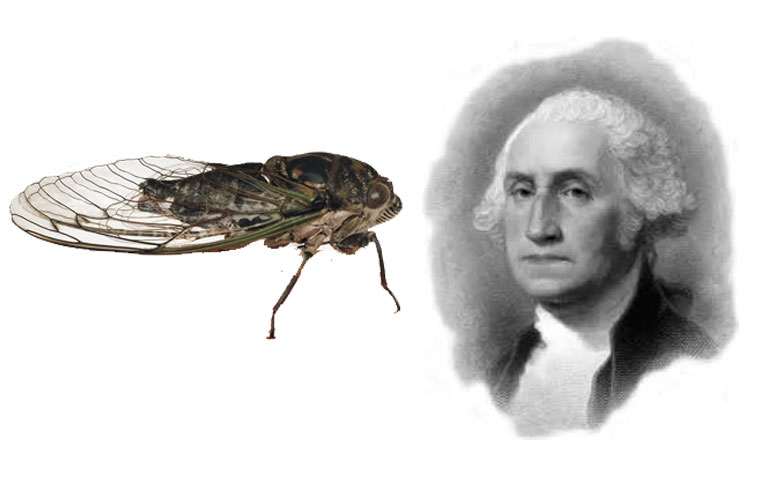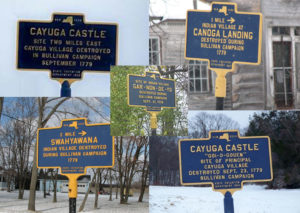
May 14, 2018
By Dehowähda•dih
The Ogweñ•yó’da’ (or cicada) is expected to return to the Onondaga Nation this summer. The people of the nation long have enjoyed the Ogweñ•yó’da’ as a great snack. As a youth, I would be given a paper bag to head out in the morning to “go picking” for a snack. My brother even took a large bag of cooked cicada to Ceremonies to share with everyone!
So one morning after picking and the cicada were in the frypan, I asked my father why we ate Ogweñ•yó’da’.
This is what he told me.
On July 4th, 1776, the American colonies declared independence from the United Kingdom and British rule. Then the Revolution began. For more than seven years the colonists and the British fought over whether that statement was true.
The Haudenosaunee was in the middle of that war. After siding with the colonists and the English a few years prior in the French and Indian War, the Haudenosaunee saw this fight as a fight between father and son and declared neutrality at Ft. Pitt in 1775.
Mohawk Joseph Brant (a British ally) did not agree with the decision for neutrality when settlers were crossing over the border into Haudenosaunee lands that were set aside for Natives in the 1763 Proclamation Line after the French and Indian War. Joseph Brant and his forces then began removing colonial settlers that have crossed over the border into Native lands.
Angered by the attacks of Joseph Brant, General George Washington in 1778 declared that all of the Haudenosaunee be destroyed.
“The Expedition you are appointed to command is to be directed against the hostile tribes of the Six Nations of Indians, with their associates and adherents. The immediate objects are the total destruction and devastation of their settlements, and the capture of as many prisoners of every age and sex as possible. It will be essential to ruin their crops now in the ground and prevent their planting more. I would recommend, that some post in the center of the Indian Country, should be occupied with all expedition, with sufficient quantity of provisions whence parties should be detached to lay waste all the settlements around, with instructions to do it in the most effectual manner, that the country may not be merely overrun, but destroyed.”
General Sullivan was selected to carry out Washington’s orders.
The Colonial army set its sights on the Onondaga, the capital of the Haudenosaunee. In April 1779, the colonial army attacked. For over ten miles from Onondaga Lake to the Onondaga villages to the south, longhouses, fields, orchards, food stores, were burned down to the ground. The people who were unable to flee, were killed.
Later that summer, the attack on the Haudenosaunee continued across all of the villages of the Haudenosaunee. The homeless Onondaga warned their neighboring nations of the ruthlessness of the approaching colonial army.
In August and September, when Sullivan came across Haudenosaunee villages, he entered unopposed as the people fled with the women and children to safety. This military operation became known as the Sullivan Campaign and the Haudenosaunee thereby named George Washington (and all succeeding Presidents), Hanadagá•yas or Town Destroyer.
But the Onondaga survived the attack, the homelessness, the extreme winter, and hunger to try to rebuild a village with very little resources. As the Onondaga struggled to feed its survivors, the Creator sent a gift to our village, Ogweñ•yó’da’ (the cicada). Thousands of cicada came and provided a much need food source to help the Onondaga survive that first year of rebuilding.
The summer of 2018, the cicada are expected to return to sing their song. My father was fortunate to hear their song five times and was thankful every time they came back. So this summer when we go out in the early morning to pick cicada for a treat, it is important to remember how grateful we are for the Ogweñ•yó’da’ that was sent to us in 1780 to help us carry on today. Forever linking Ogweñ•yó’da’ déñ’se’ Hanadagá•yas (the cicada and George Washington) into the history of the Onondaga people.
Ogweñ•yó’da’ sings at Onoñda’gegá’:
1780 – 1797 – 1814 – 1831 – 1848 – 1865 – 1882 – 1899 – 1916 – 1933 – 1950 – 1967 – 1984 – 2001 – 2018
Please Read:
Cosmos Magazine: Against the Odds, Cicada Teens Meet and Mate by Tonya Loos as she discusses Brood VII (or the Onondaga Brood) of the Cicada.
